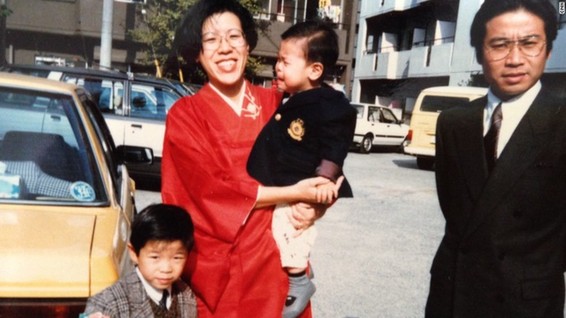當(dāng)前位置: Language Tips> 雙語新聞
Can someone stay married yet divorced at same time? Yes, in Japan, that's possible
分享到

When Yuriko Nishi's three grown-up sons left home, she asked her husband of 36 years an unusual question: Was there any dream married life had prevented him from fulfilling?
當(dāng)大西百合子三個(gè)成年的兒子離開家之后,她問了與自己結(jié)婚36年的丈夫一個(gè)不同尋常的問題:他有沒有什么夢(mèng)想是因?yàn)榛橐錾钭璧K而沒有實(shí)現(xiàn)的?
"We started wondering what path should we be walking on," says Nishi, 66. "We told our children it was a good chance to evolve our family."
“我們開始暢想我們現(xiàn)在應(yīng)該走什么樣的道路,”66歲的大西百合子說。“我們告訴孩子們,現(xiàn)在是讓這個(gè)家庭獲得進(jìn)一步演化的好機(jī)會(huì)”。
Like many others in Japan, the couple decided to graduate from marriage -- or "sotsukon."
像日本其他許多夫婦一樣,這對(duì)夫妻決定從婚姻中畢業(yè)——也就是“卒婚”。
This was not divorce.
這并不是離婚。
Sotsukon is for couples still in love, who decide to "live apart together" in their sunset years to achieve their separate dreams.
“卒婚”是指仍然相愛的夫婦,他們決定在自己的晚年“分開居住”,以實(shí)現(xiàn)各自的夢(mèng)想。
In a nation with an aging population, the idea has taken root.
在一個(gè)人口老齡化的國(guó)度里,這樣的想法已經(jīng)深入人心。
Living apart together
分開居住
Yoshihide Ito, 63, after working for decades as a cameraman in Tokyo, told his wife he wanted to escape city life and return to his home prefecture of Mie, in southern Japan, to become a rice farmer.
63歲的伊藤吉英在東京干了幾十年攝影師,他告訴妻子,他希望逃離城市生活,回到自己位于日本南部的家鄉(xiāng)三重縣當(dāng)一名種植水稻的農(nóng)民。
Nishi wished to continue her career as a fashion stylist in the capital.
大西百合子則希望繼續(xù)自己在東京的時(shí)尚造型師事業(yè)。
"He visits me once a month. I visit him for a week at a time, too," Nishi says.
她說:“他每個(gè)月來看望我一次。我也偶爾去陪他一個(gè)星期。”
Distance, she explains, helps the couple to miss and appreciate each other; they now plan date nights for the time they spend together.
她解釋說,距離有助于雙方之間的相互思念和欣賞:為了能有一起度過的時(shí)光,他們現(xiàn)在要提前籌劃約會(huì)的夜晚。
"Our marriage is in good shape. We share two totally different lifestyles."
“我們的婚姻完好無損。我們共同分享著兩種完全不同的生活方式。”
Graduating from marriage
從婚姻中畢業(yè)
The term "sotsukon" was coined in 2004 by Japanese author Yumiko Sugiyama in her book "Sotsukon no Susume" -- "Recommending the Graduation from Marriage."
“卒婚”一詞是2004年由日本作家杉山由美子在《推薦卒婚》一書中創(chuàng)造的,意為“從婚姻中畢業(yè)”。
"In Japan, traditionally the man is the head of the household, and the wife lives under his financial support as a domestic worker," says Sugiyama.
杉山由美子說:“在日本傳統(tǒng)中,男人是一家之主,妻子則是依靠男人供養(yǎng)的家務(wù)勞工。”
"I wondered what if each member of the married couple could obtain more freedom to do what they want without getting divorced?"
“我想知道,如果已婚夫婦能夠在不離婚的情況下獲得更多自由,去做他們想做的事情,會(huì)怎么樣?”
The imagination of the Japanese public was captured -- particularly that of the housewife -- at a point when changing demographics in the nation were reshaping society.
在日本不斷變化的人口狀況正在改變社會(huì)結(jié)構(gòu)的時(shí)刻,公眾——尤其是家庭主婦——心中幻想的東西被準(zhǔn)確地捕捉到了。
Just one million babies were born in Japan in 2014, according to government figures. That tally is the lowest figure on record in the Asian nation.
根據(jù)政府的統(tǒng)計(jì)數(shù)字,2014年日本只有100萬新生兒。這個(gè)數(shù)字是有相關(guān)記錄的亞洲國(guó)家中最低的。
Furthermore, Japanese women in the same year had the longest life expectancy in the world -- 86.83 years -- according to the Health, Labor and Welfare Ministry.
此外,根據(jù)日本厚生勞動(dòng)省的數(shù)據(jù),同年日本婦女的平均壽命為世界之最,達(dá)86.83歲。
"That means the longest period in a woman's life is after her kids have gone," says Masako Ishii-Kuntz, a professor of sociology at Ochanomizu University, in Tokyo. "Many empty-nesters have nothing left to do but care for their husband. They realized they should pursue their own hobbies and happiness."
東京御茶水女子大學(xué)的社會(huì)學(xué)教授石井真子說:“這意味著女人生命中最長(zhǎng)的一段時(shí)間是在孩子離家之后。許多空巢女性除了照顧自己的丈夫外沒有其他任何事情可做。她們意識(shí)到應(yīng)該去追求自己的愛好和幸福。”
Dream catchers
追求各自的幸福
In recent years, celebrity endorsement has pushed sotsukon deeper into the mainstream.
在最近幾年,名人的支持推動(dòng)“卒婚”現(xiàn)象更加深入地進(jìn)入了主流社會(huì)。
Most famously, in 2013, Japanese comedian Akira Shimizu and his wife announced they would graduate from marriage, and published a book "Sotsukon -- A New Form of Love."
最著名的例子是2013年,日本喜劇演員清水明和妻子宣布將從婚姻中“畢業(yè)”,并出版了《卒婚:愛的新方式》一書。
While there are no official figures on how many couples in Japan have followed this path, a 2014 survey commissioned by Interstation architecture agency in Tokyo found a widespread desire to do so.
盡管沒有具體的官方數(shù)字,但2014年由Interstation建筑事務(wù)所委托在東京進(jìn)行的一項(xiàng)調(diào)查顯示,人們有廣泛的“卒婚”意愿。
Of the 200 married women polled, aged between 30 and 65 years old, 56.8% said they eventually wanted to graduate from marriage.
在接受調(diào)查的200位年齡在30至65歲的已婚婦女中,有56.8%的人表示,她們最終希望從婚姻中“畢業(yè)”。
Retirement was the period of life most women identified as the ideal point to undertake sotsukon.
退休被大多數(shù)婦女當(dāng)作是開始“卒婚”的理想時(shí)間點(diǎn)。
Be nice to your wife
日本女性地位提高
More recently, Japan's Prime Minister Shinzo Abe has made women entering -- and remaining in -- the workforce a pillar of his economic policy. "Abenomics is womeneconmics," he declared at the World Assembly for Women in Tokyo last August.
最近,日本首相安倍晉三已經(jīng)把女性進(jìn)入——并且持續(xù)留在——?jiǎng)趧?dòng)力隊(duì)伍中作為自己經(jīng)濟(jì)政策的一個(gè)支柱。去年8月他在東京的世界婦女會(huì)議上宣稱:“安倍經(jīng)濟(jì)學(xué)就是婦女經(jīng)濟(jì)學(xué)。”
In 2014, 64% of women aged 15 to 64 in Japan were working, compared to 46% in 1969. "More Japanese women are now at work and therefore receiving pensions," says Ishii-Kuntz. "The wife knows she can make her own living."
2014年,日本年齡在15歲至64歲的女性中,有64%的人是職業(yè)女性,而這一比例在1969年時(shí)為46%。石井真子說:“現(xiàn)在有更多的日本婦女進(jìn)入了職場(chǎng),因此將會(huì)有退休金。妻子們知道她們可以自食其力。”
To Ito, this is important. "I don't know if we can really call it sotsukon if the wife's lifestyle is being paid for by the husband," he says. "Wives need to be financially independent to truly graduate from marriage."
對(duì)伊藤來說,這一點(diǎn)十分重要。他說:“如果妻子的生活方式是由丈夫出錢維持的話,我不知道那是否真的可以稱之為‘卒婚’。做妻子的需要在財(cái)務(wù)上獨(dú)立,才能名副其實(shí)地從婚姻中畢業(yè)”。
Individualization of the family
家庭成員日趨獨(dú)立
The Japanese family as a whole is changing, says Ishii-Kuntz。
石井真子說,作為一個(gè)整體,日本家庭正在發(fā)生變化。
"Family members have become more individualized. Each family member is allowed to seek whatever he or she wants, rather than spending all their lives taking care of family members," she says.
她說:“家庭成員變得個(gè)性化。每一個(gè)家庭成員都可以尋求他或她想要的東西,而不是把一輩子都用于照顧家人。”
Multiple generations of adults living in one household is becoming increasingly rare in Japan, she adds. Furthermore, it is not unusual for husband and wife to sleep in separate beds in the same room.
她補(bǔ)充說,幾代同堂的家庭在日本正在變得日益罕見。此外,夫妻在同一個(gè)房間里分床而睡的情況也并不少見。
Perhaps sotsukon is the ultimate climax of that individualization.
也許“卒婚”是這種個(gè)性化的終極表現(xiàn)。
Graduating from the traditional strictures of marriage, however, does not have to translate into an end of intimacy or loss of love.
不過,從婚姻的傳統(tǒng)束縛中“畢業(yè)”,未必需要解釋為親密關(guān)系的終結(jié)或愛情的消失。
Nishi smiles: "After having lived apart, I cherish him more. If I marry again, I want to marry him."
大西百合子微笑著說:“在分開居住后,我更加珍惜他了。如果我再結(jié)一次婚,我希望還能嫁給他。”
(來源:CNN & 參考消息 編輯:杜娟)
上一篇 : Vogue雜志找百歲老太當(dāng)模特
下一篇 : 美國(guó)科學(xué)家研究起死回生術(shù)
分享到
關(guān)注和訂閱


關(guān)于我們 | 聯(lián)系方式 | 招聘信息
電話:8610-84883645
傳真:8610-84883500
Email: languagetips@chinadaily.com.cn